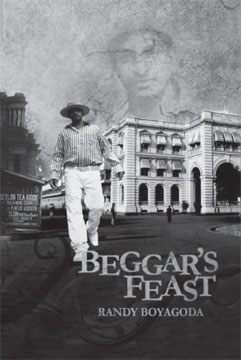Rags to riches picaresque
Reviewed by Ian Mc Gillis
|

Beggar’s Feast
Authour : Randy Boyagoda
Perera-Hussein
|
A picaresque hero, the Oxford Learner's Dictionary tells us, is "a
person who is sometimes dishonest, but easy to like." For future
editions, the folks at Oxford might want to consider citing the hero of
Randy Boyagoda's picaresque second novel as Exhibit A - though it must
be said that Sam Kandy does stretch the "sometimes" and "easy" parts of
that definition as far as they'll go without snapping.
Rags-to-riches narratives seldom have much humbler starting points
than the Ceylon village where Beggar's Feast's protagonist is born in
1899. Warned by the local astrologist that their son's horoscope
portends family disaster, his parents shunt him off to a Buddhist
monastery on his 10th birthday.
But this boy has a very different life in mind for himself. Quickly
giving the monks the slip, Sam (the name he gives himself on
reinvention) soon finds himself hustling on the streets of Colombo.
Pursuing his life's mission to return victorious to his home village, he
proceeds, via a tortuous route, to a self-willed transition from a "no
one from nowhere" to shipping magnate and man of substance.
Sam's life
Beggar's Feast spans the hundred years of Sam's life. Many writers
taking on an equivalent historical sweep would probably have filled a
novel twice this one's length, but Boyagoda, the Oshawa-born son of Sri
Lankan immigrants, has a flair for concision. Decades of history and
politics are represented with the deftest of sketches, as with the
observation of how "one morning in 1972 (the name) Ceylon was decreed
banished from the island, only to be found alive and thriving in London
and Dubai, Scarborough and Brampton, where it became the watchword of
conjuring emigrants ignored by their television children."
Boyagoda's central creation might be dismissible as simply a handy
symbol for Sri Lanka's fitful century-long progress from backwater
colony to internally divided modern state, except that Sam is very much
his own man. He won't be contained.
Boyagoda is certainly unconcerned with any conventional notion of
character sympathy: Sam exhibits a streak of cruelty that can be only
partially explained away by his childhood humiliation and his broader
status as an exploited subject of colonialism.
He mistreats people because he can. Spouses are cynically acquired,
callously abandoned and, in one case, killed; children are alternately
lavished and ignored.
Soul
You might say Sam gains the world and loses his soul except that the
circumstances of his life make the very concept of soul seem like a
bourgeois indulgence. And yet, against all better judgment, the reader
warms to him and his single-minded drive to transcend his origins. He's
Naipaul's Mr Biswas as unapologetic success rather than embittered
failure, Richler's Duddy Kravitz followed far past his apprenticeship.
If you've found a place in your heart for either of those complicated
figures, make way for Sam Kandy and meet Randy Boyagoda at the 2012
Galle Literary Festival. |

